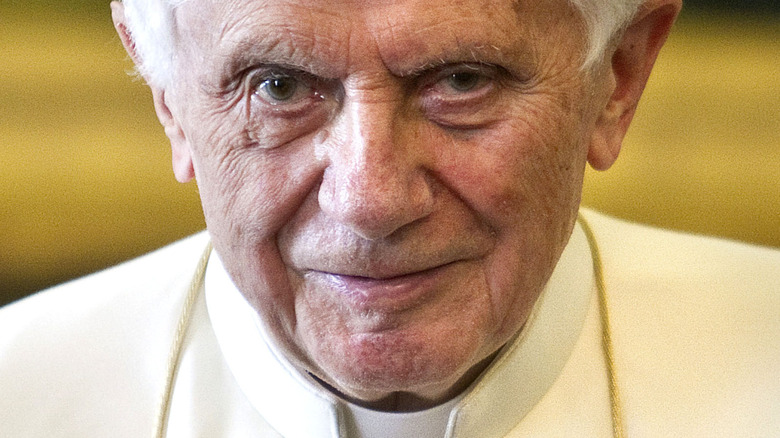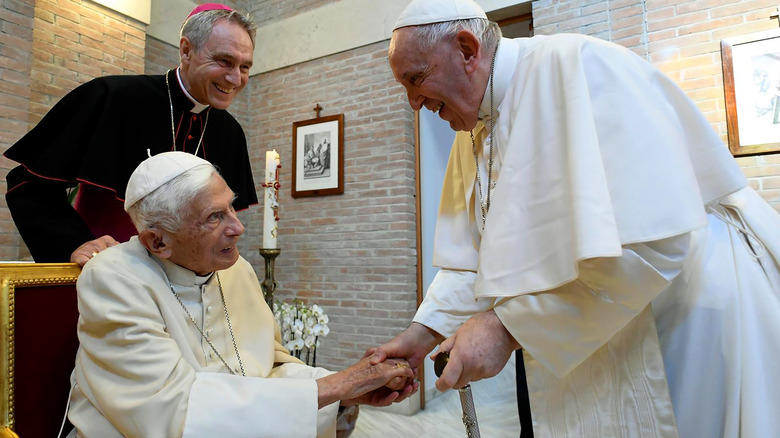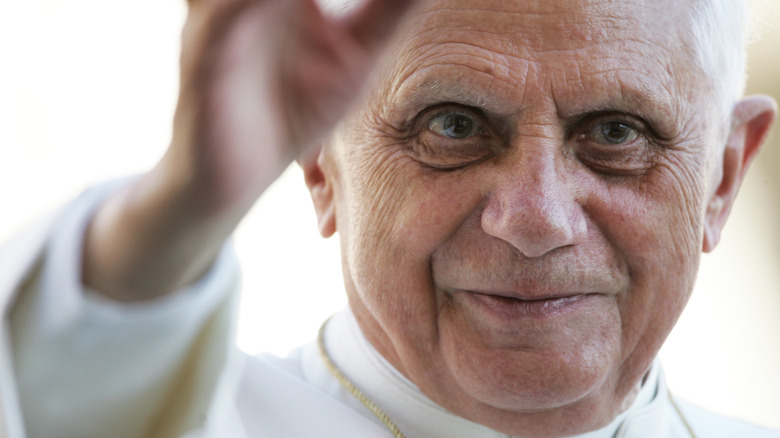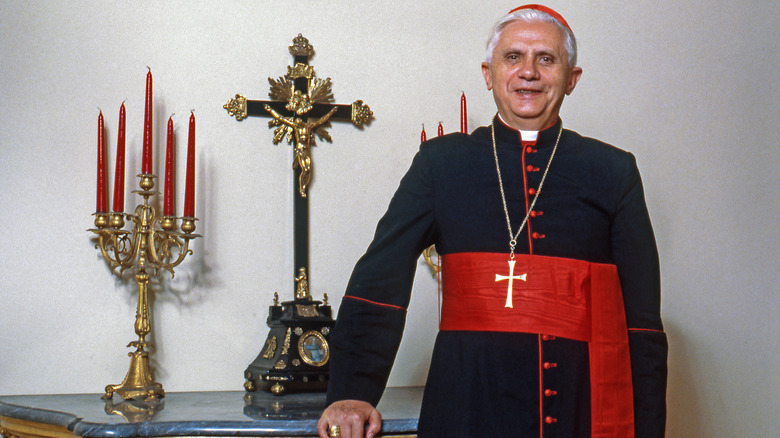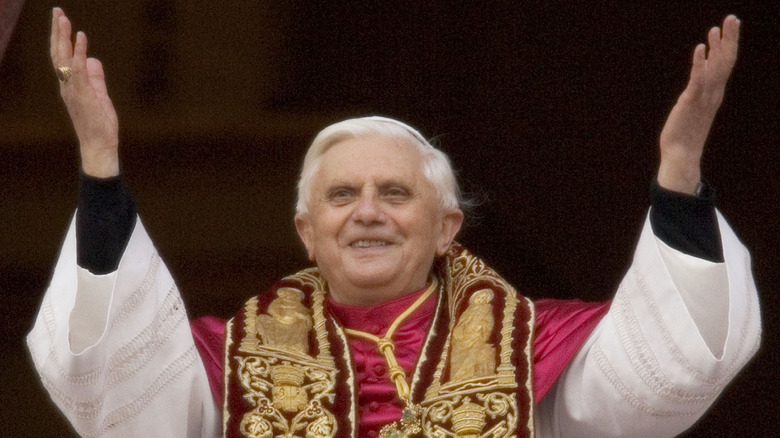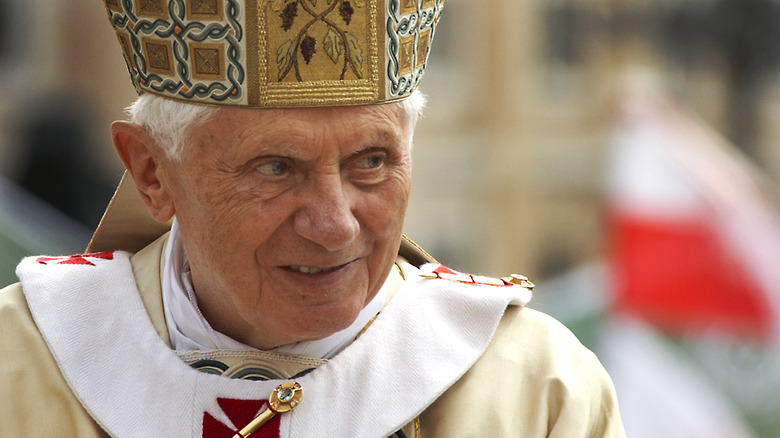What We Know About Pope Benedict XVI's Death
Pope Benedict XVI, who served as the head of the Catholic Church from 2005 to 2013, died on December 31 at the age of 95. The former Pontiff's death follows reports that he had experienced rapid health deterioration due to his age, according to CNN. On December 29, Pope Francis revealed he had recently visited his predecessor and asked for prayers to "accompany him in these difficult hours," even as the Vatican issued a statement claiming Pope Emeritus Benedict was "lucid and conscious" and being closely monitored by doctors, according to CBS News.
Pope Benedict XVI cited his "advanced age" when he unexpectedly announced his retirement in 2013, becoming the first pope in 600 years to voluntarily retire from the position and earning him the title pope emeritus, per The Economic Times. Since most popes serve until death, allowing for a new one to be elected after their funeral, Pope Emeritus Benedict XVI's death has created a unique situation for Catholics in which one pope will likely preside over the funeral of another, reports TIME.
Pope Benedict XVI grew up in a time of war
Pope Benedict XVI was born as Joseph Ratzinger on April 16, 1927, in Germany, the son of a police officer and hotel cook, per Biography. His family, which included his two siblings, were forced to move often as the Nazis took to power in Germany in the 1930s. Although his father was rigidly against Nazism, Ratzinger was forced to join the Hitler Youth when he turned 14 in 1941 after it became mandatory and despite having entered a preparatory seminary in 1939.
From there, he was drafted into the anti-aircraft corps and, eventually, the regular military, which he deserted. He was then captured by American troops and sent to a prisoner of war camp, only to be released at the end of World War II in 1945. In his book, "The Salt of the Earth," Pope Benedict XVI wrote, "The following months of regained freedom, which we now had learned to value so much, belong to the happiest months of my life" (via Associated Press).
He quickly returned to the seminary after the war
Following the war, Joseph Ratzinger returned to the seminary at the University of Munich, and he became an ordained priest in 1951. Soon after, he earned his doctorate and began teaching theology at various colleges, including Freising College and the University of Bonn, all before reaching the age of 30. The former Pontiff continued teaching throughout the 1960s, accepting positions at University of Muenster, University of Tübingen, and University of Regensburg. During this time, Ratzinger was awarded with various promotions within the Catholic Church, all of which would lead to his future role as pope.
Among his many achievements, Ratzinger was a founder of the journal "Communio," considered to be one of the church's most important journals. In 1977, he became archbishop of Munich and Freising before being granted the title of cardinal. In 1981, his predecessor, Pope John Paul II, appointed Ratzinger to the role of prefect, or leader, of the Congregation for the Doctrine of the Faith, the Vatican's investigative institution that protects the religion's doctrine and morals, according to Church Authority. The position proved to be the ultimate stepping stone for Ratzinger to the Bishop of Rome.
He became pope in 2005
Upon Pope John Paul II's death in 2005, Cardinal Joseph Ratzinger was elected as the new leader of the Catholic Church. During his first speech to a general audience, he revealed he chose to adopt the name Benedict because of its association with past figures, including Benedict XV, who held the title during World War I, and St. Benedict of Norcia, who founded the Benedictine Order, per Catholic News Agency. "In the joy of the risen Lord, trusting in his permanent help, we go forward," Pope Benedict XVI said in his first speech (via NPR).
During his papacy, he expressed conservative views on topics such as abortion, homosexuality, and Catholicism, and he came under scrutiny when allegations of sexual and physical abuse by priests made headline in 2010. The Vatican denounced accusations he had helped cover up sexual abuse during his time as prefect of the Congregation for the Doctrine of the Faith. After his retirement, Pope Emeritus Benedict XVI addressed the criticism of his handling of the abuse scandal by attributing the crisis to a diminishing of morals in the 1960s and lack of belief in God, writing, "As far as I can see, in most reactions to my contribution, God does not appear at all" (via National Catholic Register).
His papacy was tainted by scandals
Although much of his papacy was challenged by the abuse scandal within the Catholic Church, Pope Benedict XVI spoke out against clerical abuse during visits to the United States and to the United Nations, per Biography. He also sought to foster peace and understanding between theologians of different religions, addressing the first Catholic-Muslim Forum. However, he later came under criticism for remarks he made about the Islamic prophet Muhammad, which caused public demonstrations in countries such as Pakistan, according to Georgetown University.
Despite his conservative stances on most topics, Pope Benedict XVI understood and embraced modern technology to deliver his messages to more people. He became the first pope to use Twitter, utilizing the platform to promote his messages to newer, younger demographics, as The Daily Beast notes. He also oversaw the launch of the Vatican's official YouTube channel and was the first pope to give full media interviews.
Pope Benedict XVI was a prolific writer
Outside of his papacy, Pope Benedict XVI was known as an accomplished pianist and prolific writer who valued intellect and discipline, according to The Independent. He authored more than 60 books dedicated to religion, and published an autobiography in 2016 titled "Last Testament: In His Own Words." In 2013, he announced his retirement from the papacy, citing his age and health as a concern. After his retirement, he admitted he had a "lack of resolve in governing and decision making" and praised his successor, Pope Francis — with whom he remained close and influenced enough to encourage thoughts of retirement.
In 2016, Pope Francis celebrated Benedict's 65th ordination anniversary with a special ceremony, during which the former pope thanked the current one for allowing him to live out the remainder of his life in the Vatican gardens. "Thank you, Holy Father, for your goodness, which, from the first moment of your election, has struck every day of my life," he told Pope Francis (via The Irish Examiner).
